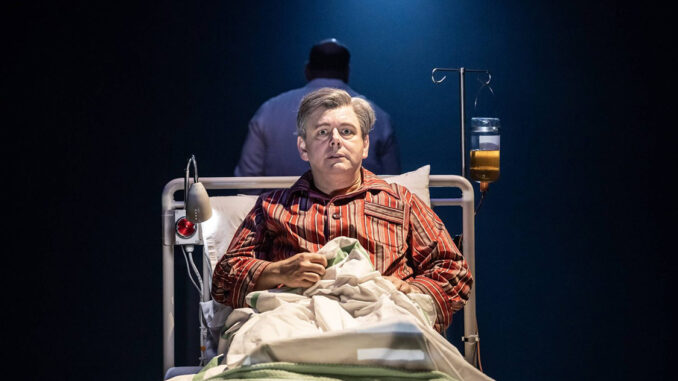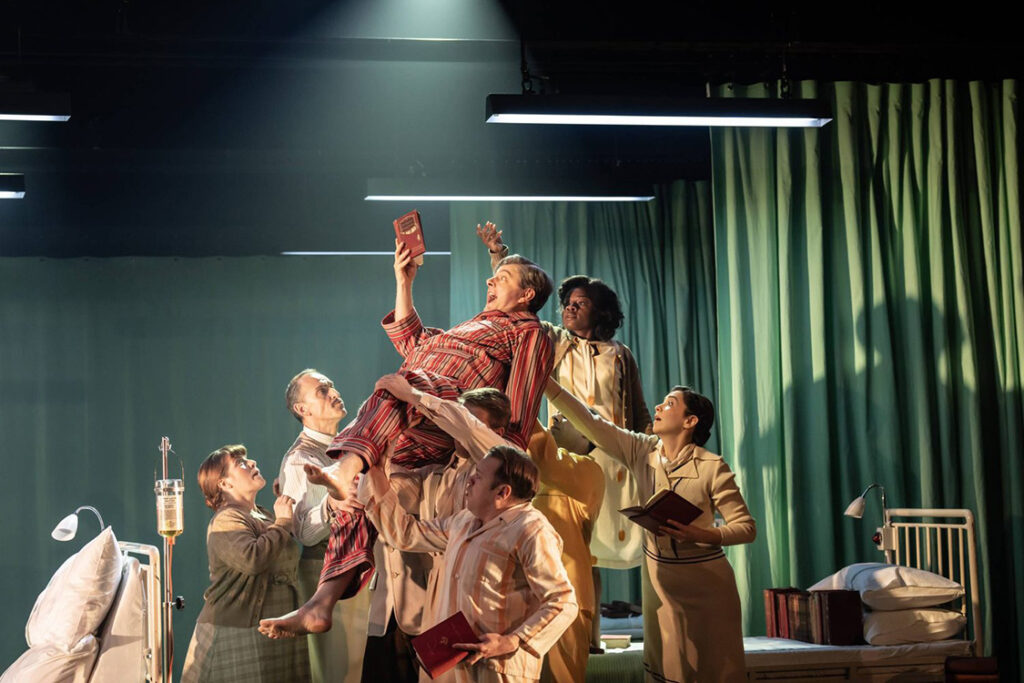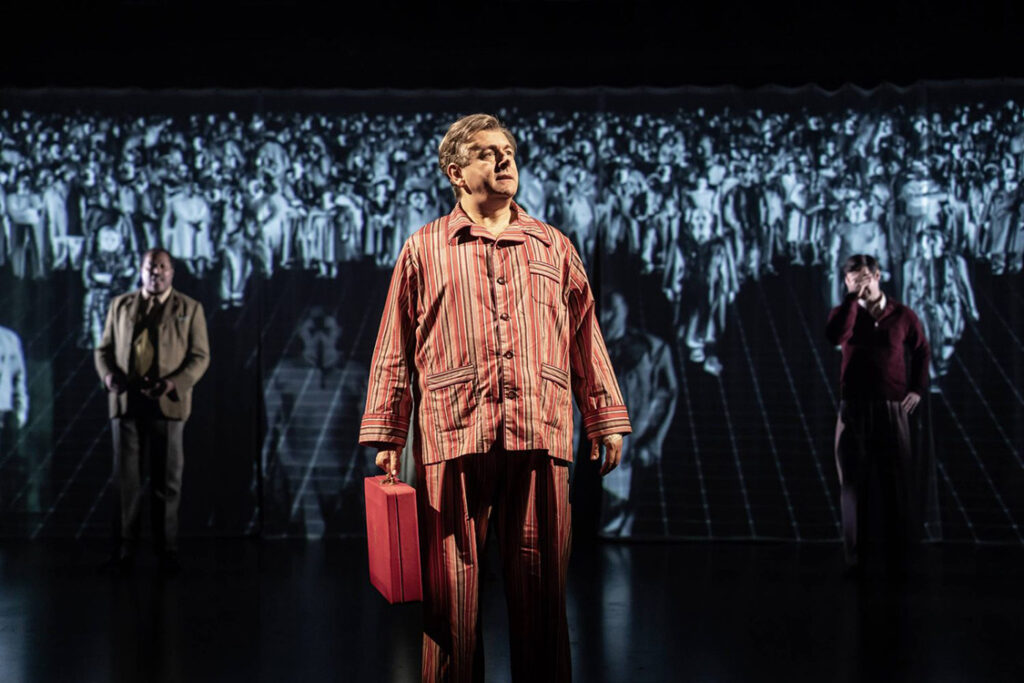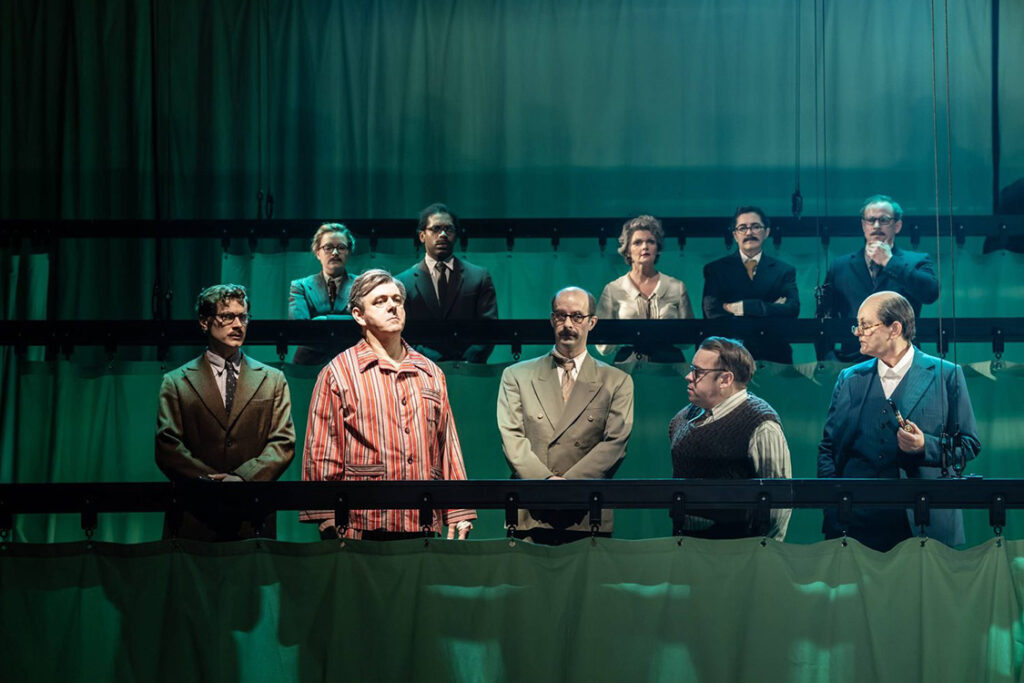
Nye, a new play by Tim Price at the National Theatre until 11th May (and in cinemas around the country from April), should make us proud, then angry – and finally mobilise us to defend Bevan’s dream argues Dr John Puntis
This is an extraordinary play that everyone should see, with a memorable performance by Michael Sheen as Aneurin (‘Nye’) Bevan.
The play explores much of Bevan’s life from school days until death at the age of just 62 years. The second half is concerned largely with the setting up of the NHS, including battles with the medical profession, Conservative party members and some in Labour’s own ranks.
Although there is no overt reference to the acute crisis the NHS now faces, the play ends with a celebratory mention of the current 1.3m patient interactions each day projected onto the stage curtains. No doubt many audiences will prompted to reflect on the dire state of the NHS at present and the risk it faces of being dismantled by our political leaders. Much of the story of the foundation of the NHS is told through short, powerful personal stories of those who could not afford care, which will provide chilling reminders of what many people are now experiencing once again and point to the dismal future if this situation cannot be reversed.

The parliamentary battles portrayed in the play clearly illustrate how opposed the Conservative party was to Bevan’s radical (nationalisation of over 2,500 hospitals), comprehensive plans, and they expose more recent claims by Hancock and Hunt, to the effect that their party created the NHS, as no more than a gross misrepresentation of history.
The stage set is that of a hospital ward bedecked with green curtains. The play opens with Bevan in bed and just returned from the operating theatre, having undergone surgery for a duodenal ulcer but found to have stomach cancer. In a post-operative and morphine induced delirium he remembers past incidents in his life.
The play the stage is rapidly transformed into a school room, library, meeting room, office, debating chamber and bar at different times. This is done with great elan and with a strong cast of supporting actors. A highlight is a big band song and dance routine which seems entirely in place! Jenny Lee (Bevan’s wife, the youngest MP in parliament when she was elected, and one of only five women) is often at his side, but little is shown of her extraordinary career – and her role in the Independent Labour Party, and later as Minister for the Arts, and overseer of the creation of the Open University.

The play takes us through Bevan’s difficult school years, working in the coal pit from the age of thirteen (his miner father dying later from pneumoconiosis), unemployment, and reliance on his sister to support the family. He becomes chairman of the miner’s Union Lodge at the age of nineteen and engages together with friends in various local organisations including the Tredegar Medical Aid Society, where he gained much political and organisational experience challenging the Tredegar Iron and Coal Company. Bevan also chaired the local action committee in the 1926 general strike and was elected MP for Ebbw Vale in 1929.
He denounced the Labour Party leadership on issues of principle, and was disciplined by them. He argued for UK support for the Spanish Republic, and was fiercely critical of Churchill’s leadership during the Second World War.
Appointed Minister for Health and Housing in the Attlee government in June 1945, he subsequently oversaw the creation of the National Health Service following fierce political battles in order to provide comprehensive medical care, free at the point of need across the UK. Becoming Minister of Labour in 1951, he resigned after two months, in protest at the introduction of charges for prescriptions, dentistry and eye care.

This play should arouse people’s pride in the NHS, but then make them angry. The situation of the pre-war health services being divided into those inadequate ones for the poor and the best that money could buy for the rich is now being realised once again as the clock is turned back in the name of ‘reform’.
The play is a triumph and the packed National Theatre gave the excellent cast a standing ovation – and one suspects – the NHS itself.
Sadly, the elation felt at seeing how the NHS was built and what it achieved contrasts sharply with the current reality facing the NHS, but for campaigners fighting to prevent its destruction, the play should energise and mobilise all those many people flocking to performances.
The founding principles of the NHS remain the basis for providing high quality care to all and politicians need to grasp this together with Keep Our NHS Public’s campaign for a restoration of the ‘People’s NHS’.
It is time to find the same courage to invest in our future as was summoned in 1945, despite a war ravaged economy and much higher levels of government debt. Bevan would want us to use all our organisational skills and powers of persuasion and to fight for his NHS tooth and nail to ensure a revitalised and restored service giving best care for everyone irrespective of their wealth.
We highly recommend the play to all our supporters and everyone who cares about our NHS. The play also presents an ideal opportunity for Keep Our NHS Public activists to leaflet audiences either at the National Theatre, or outside cinemas when it is live streamed in April (see https://nye.ntlive.com/).

I wonder if KONP in London is using this opportunity to raise awareness? (I’m a member of the Nottingham
Group… And I have tickets to see the play on 06/05).
Hi Paula – yes we are encouraging London activists to get down to the performances and leaflet. The play is also travelling to Cardiff before being screened in Cinemas up and down the country from April. Let us know how you like the show!
I have just watched ‘Nye’ at my local cinema. I found it to be extremely moving. Nye Bevan was a force of nature, he was probably the only politician who could have pulled off the creation of the NHS in such a short space of time in a war-ravaged country. It is recommended viewing for everyone, especially now that our beloved NHS is under such pressure.
I agree that: “We highly recommend the play to all our supporters and everyone who cares about our NHS.” But also the naysayers could benefit from learning about the conception of the NHS.